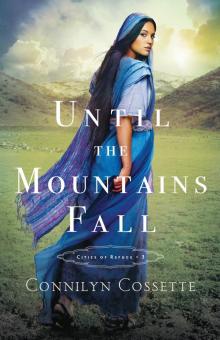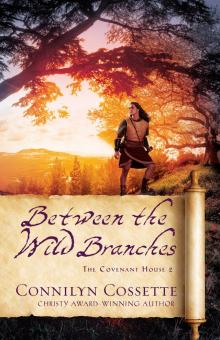- Home
- Connilyn Cossette
Until the Mountains Fall Page 2
Until the Mountains Fall Read online
Page 2
She refused to look at me, but I knew every line of her face: the regal curve of her dark brows, the way her full lips twitched when she was holding back a sharp retort, the elegant sweep of her cheekbones, those wide amber eyes that missed nothing—nothing except how much I desired her.
Even now, standing within the circle of our family and friends, ready to pledge my commitment to take her as my wife in three months, shame curled an iron fist around my lungs. Could they see? Did they know how double-minded I was over having everything I’d ever wanted at the expense of my older brother’s life?
Her father, Amitai, held high the ketubah document and began reading aloud the terms of our betrothal. Rivkah’s expression was indecipherable as the mohar my father had put forward was outlined, the bridal gifts equal to those he’d offered with Gidal’s marriage, even though it was neither necessary nor expected. But when the special circumstances surrounding our marriage were recited—that the first son conceived of our union would be counted as Gidal’s heir, as his own flesh—her jaw went hard and her shoulders tightened.
Was her grief so acute that even the mention of his name caused her body to tense and her breath to catch? They’d only been newly wed when my brother had passed from this world, had only just begun their life together when it was cut short. How could I possibly take the place of a man as upright and honorable as Gidal? Would she ever find me worthy of filling the void he’d left behind or welcome my touch when the time came? Blinking away thoughts of Gidal and Rivkah together, along with the disturbing mixture of envy and anticipation those images conjured, I instead focused on my father and the basket of household goods, pieces of silver, and jewelry near his feet—the mohar destined for my bride.
“Do you agree to the terms set forth within this ketubah?” Amitai asked as he handed me the rolled papyrus. “Will you take my daughter as your wife, treat her with the respect and care the Torah prescribes? Will you commit to ascribing the firstborn son of your union to your brother Gidal?”
My affirmative answer was swift and strong. “I will.” Although Gidal and I had been opposite in so many ways, no two brothers had loved each other more. If I could have died in his place, I would have. Fulfilling my duty to his widow had never been a question in my mind.
Amitai turned toward his daughter, his expression surprisingly stern. “And will you accept Malakhi as your husband and treat him with the respect and care the Torah prescribes? Will you commit to ascribing the firstborn son of your union to your husband Gidal?”
An extended pause echoed through the courtyard, one that amplified my thudding heartbeats and the restless shuffle of some child’s sandals behind us—most likely my youngest sister, Tirzah, for whom stillness was as much a burden as it was for me. Amitai frowned at his daughter’s delayed response. Although Rivkah held her posture straight, a faint flutter of her dark eyelashes made it clear she was agitated. When finally her lips parted to speak her agreement, her flat tone told me more than her sharp tongue ever could—this marriage was begrudging fulfillment of a duty for her, nothing more.
As well-wishers crowded around us after we’d shared a cup of wine to confirm the binding contract between us, I watched her from the corner of my eye. Although her mouth curved into a semblance of a smile as she graciously accepted each embrace and blessing for our betrothal, it was evident that she wanted nothing more than to flee.
I had known Rivkah before I could even walk. Our mothers had raised us all in tandem, and nearly every childhood memory I had included her. Granted, for the first fourteen years of my life she’d been more of a sister to me than anything, but one chance moment beneath a flowering terebinth two years ago had changed everything, transforming Rivkah from the girl I’d teased to exasperation into one whose beauty enthralled me nearly as much as her intelligence and spirit. I’d gone from devising ways to provoke her ire to dreaming up ways to draw closer to her.
For months after that I’d tried to make amends for my behavior toward her, but she rebuffed my every awkward attempt. She saw me only as the boy who’d antagonized her for so long. And then, only a year later, my father announced she was to marry Gidal, and all hopes of making her mine someday were dashed to pieces. So I’d stepped away, determined to respect my brother no matter the cost to my heart. But now that Rivkah would soon be my wife, I’d do everything in my power to make her understand how much she meant to me.
Rescuing us from the crush of friends and family, my mother ushered Rivkah and me to the low table in the center of the courtyard. Seated cross-legged on plump cushions, our knees brushed together only once before my betrothed scooted a handbreadth away. Yet even that contact was enough to set my blood racing.
After handing me a loaf of flatbread, my mother gave my shoulder an affectionate squeeze before moving on to serve the rest of those who’d gathered around the table and in groups all over the courtyard, breaking bread together in honor of our betrothal.
Taking the pillowy round of barley loaf in my hands, I tore it in two, handing one half to Rivkah. The rich aroma of the fresh bread wafted through the air, and my eager stomach snarled. A small bowl of spiced and salted olive oil sat on the table between us, so I nudged it toward her with a finger. With a tight smile that more resembled a grimace, she dipped her bread into the oil and I did the same. We were expected to offer a bite to one another, another sign that our covenant was binding for life.
Leaning nearer, I lifted the offering to her lips, my hand shaking slightly as my fingers neared her mouth. I’d not been this close to her since I was a boy. Wordlessly, she accepted, using only her teeth to swiftly snatch a bite and still refusing to look into my eyes as she did so. She reciprocated the gesture with jerky movements, and then looked away, taking a long draft of her wine, her discomfort so obvious that I half expected her to jump up from the table and flee.
Determined to use these next few months to win her over, I edged closer, hoping that the overlapping voices encircling us would afford a measure of privacy. “There is no need to be uneasy, Rivkah. You and I have known each other our whole lives.”
Her attention snapped to me, her golden-brown eyes traveling over my face and her mouth pursing. “I am not uneasy.”
“A lie if I’ve ever heard one.”
Her lips parted in shock at my brazenness.
I shrugged a shoulder.“When you are anxious your eyelids flutter.”
Her eyes narrowed. Had I given my obsession away with my too-sharp observation? To cover my misstep, I spread a wide smile across my face, one that seemed to entice many young ladies to linger near the foundry whenever I was at work there with Eitan. Instead of returning the gesture, she scowled and mumbled something under her breath about me “not having changed in the least.”
Apparently the long history we shared, along with my childhood follies, would be a stumbling block to my pursuit of her favor. Three months was a short time to change her ingrained opinion, but I loved nothing more than a challenge. I would chip away at her walls, help her forget her grief, and pray that someday she would come to love me.
“I am sorry,” I said.
Rivkah seemed dumbstruck by my words.
“I was unkind to you as a boy.”
“You were hideous.”
“That I was.” Leaning closer, I pinned her with a knowing look and a smirk. “But you were all too fun to rile.”
And indeed, for years I’d made it my duty to vex her until her amber eyes would flash, her fists would slam to her hips, and her pretty mouth would bunch into a furious little pout before she would tear off, black braids streaming behind her as she ran to tell her father, or mine, about my misdeeds.
Entranced by that pursed mouth now, even as she pretended to ignore my teasing remark with a haughty lift of her chin, I could not help but remember the moment I’d begun to wonder what it would be like to press my lips to those rose-colored ones.
“Tell me, Rivkah . . .” I ignored the way her body stiffened at my nearness as I b
ent to whisper into her ear. “Will you sing for me when we are married?”
“I don’t know what you are talking about,” she snapped, taking another sip of wine and turning away.
Until the day I’d followed her out to the very edge of Kedesh’s boundary two years ago, I’d never heard her voice lifted in song, nor had I since then. Perhaps it was something she only did in solitary moments. Unmerited jealousy washed through me as I wondered whether in the privacy of their chamber, she’d sung one of those secret songs to Gidal.
“What were you writing that day beneath the terebinth tree?” I asked, confident that she would remember the moment she caught me spying on her as she’d alternated between singing and scribbling on a scrap of papyrus. Her mind was too keen to forget such a thing. She was the only woman I knew who’d been trained as a scribe, assisting her father as he tended to the administration of Kedesh, and she was able to speak more languages than I’d even known existed. There was no woman like Rivkah in the territory of Naftali, perhaps in all of the tribes of Israel—brilliant, beautiful, and with a voice as rich and smooth as date honey.
“That is none of your concern,” she said, giving credence to my assumption, even as she kept her gaze latched on some far point across the courtyard instead of meeting my eyes.
Deciding it was better to goad her than endure her shunning, I reached over and slid a finger across the back of her hand. “A poem, perhaps? Or a love song?”
She gasped and yanked her hand away, nearly knocking over her wine cup in her haste. When her eyes finally met mine with golden fire, I grinned and leaned even nearer, glad that no one would question our proximity on the night of our betrothal. I breathed deep, taking in the floral scent of her hair and skin, my entire body humming with the pleasure of being so close to her and wishing that these next months of waiting would pass quickly. “Perhaps one day you’ll even write such words for me.”
Silence vibrated between us, blocking out the buzz of conversations all around, and for one shining moment I wondered whether anyone would notice—or care—if I stole a kiss from my bride. But then she went rigid. Her mouth hardened into a firm line, and the voice with a capacity for singing dulcet tones came out like the edge of a rusted knife. “It’s not too late to undo this.”
CHAPTER
three
Rivkah
“You don’t want me as a wife.” I tilted my head toward the group of girls, heads together, whispering and watching the two of us from across the courtyard. “Besides, there seem to be plenty of other brides eager to take my place. Ones your own age.”
“We are but two years apart,” he said, his voice husky, his expression unreadable.
I’d been married, and then widowed, over the last five months. Those two years seemed a lifetime in my opinion. In truth, even at eleven years of age my very bones had felt ancient as I watched my beautiful, gentle mother be carried away to her grave, the stillborn child she’d given her life for wrapped in her eternal embrace. My mother had been my soft place, the one person who’d understood me. Surely if she were here she would be on my side. A flash flood of loneliness roared though me, but just as swiftly I swept it aside. She was not here to stand up for me, so I must do it for myself.
“You should end this, Malakhi.”
He responded with a stretch of silence so long that I searched his countenance with elevated hopes. But then he took those hopes and destroyed them as thoroughly as if he’d tossed them over the wall of Kedesh to the rocks below.
“No. I will fulfill my duty to my brother,” he said, the depth of his voice belying his youth.
“Your duty,” I repeated.
“Of course. I loved my brother, Rivkah.”
“This is no reason for us to be trapped together for a lifetime, making each other miserable.”
A hint of a grin curved his lips, and his eyes took on a distinctively mischievous glint. “We won’t be miserable.”
I scoffed. “You and I are oil and water. We have despised each other since we were children. Misery is all but guaranteed.”
His playful expression dissipated. “I don’t . . . I’ve never despised you.”
I waved a hand. “Indifference is the opposite side of the same stream.” His eyebrows came together in a swift move that I would interpret as a flinch on anyone besides Malakhi. “And I have no interest in being a wife who sits at home while her husband makes of fool of her with other women.”
Now he did recoil. “I would never—”
“Oh, spare me your protest. You are the most faithless person I’ve ever known. You cannot sit still for an hour. You were forever running off on Gidal when he needed your help. There is not a female form you don’t ogle.” I waved a hand at his all-too-handsome visage. “And none of those females would turn you away from their door and you know it. Your brother I trusted to be loyal. But you”—I scoffed—“you won’t last a month.”
I’d seen Malakhi arrogant before. I’d seen him excited and carefree and petulant when he did not get his way, but I’d never seen him so stricken, unable to form words on that glib tongue of his. The sight of it was nearly enough to make me apologize for my harshness. Instead, I plowed forward, his gaping mouth and blank eyes assuring me of victory. “Surely this cannot be what you want either.”
He said nothing, his attention seeming to have been drawn away by the sight of his mother and father across the courtyard, their heads close together. Darek’s hand was on his wife’s hip as she spoke, his gaze intent on her face. Among the many marriages arranged by parents eager to secure tribal connections or familial ties, theirs stood as a testament to steadfast love that crossed impossible barriers, withstood the test of time, and weathered storms, separation, and heartache. How the two of them could even stay upright, could walk through this day that seemed such an affront to the son they’d lost, was far beyond my comprehension.
“This betrothal is what I want,” he said. “We will be married. We will honor Gidal, and I will never be unfaithful to you. To do so would be the same as treading on my brother’s grave.” I’d not dreamed that Malakhi would consider this travesty as truly honoring to his brother.
“And someday . . .” His sober expression transformed into that same smile he’d given those girls before the ceremony—the one I’d imagined myself impervious to, and yet caused a flicker of something traitorous in my pulse. His gaze traveled back to his mother and father, their focused attention on each other as intimate as any embrace. “Someday you’ll look at me just like that.”
How dare he refuse to release me.
I fumed as I took down the name of the farmer in front of me on a sheet of papyrus with neat, compact marks, along with the amount of produce he’d brought to the Levites as yearly tithe. Then I directed the man to take the baskets into the storehouse, even as I continued muttering to myself about Malakhi’s audacity. It had been over two weeks since the betrothal ceremony, and I’d not seen much of him. Ignoring my plea, he acted as though we’d never even had the conversation in the first place and instead offered me knowing smiles that suggested I would all too soon capitulate to his charm. Without looking up, I gestured for the last person in line to join me under the black goat-hair canopy where I’d been writing names and cataloging offerings all afternoon.
From the moment I’d discovered the magic of written symbols I’d been smitten. I’d spent my early childhood watching my father craft words from a mysterious series of lines and curves as he tended to the administration of Kedesh, and eventually he’d given in to my pleas and taught me as well. The dance of ink over finely woven plant fibers became an act of worship, a connection to the Creator of language himself, especially when the words of a new song spilled from my heart onto a sheet of papyrus. But I rarely indulged in that pastime anymore. Singing only made my heart ache for my mother, and as much as I enjoyed serving as a scribe for my father, I’d been inordinately tired lately, both in body and soul. I massaged the ink-stained crook of my thumb, glad
that the offering line had dwindled and my job was nearly complete.
A waterfall of multicolored apples thudded to the ground in front of me, bouncing in the dirt and rolling in every direction. A young woman about my age knelt down to retrieve her fruit, uttering a low curse. Setting aside my scribing tools and the slab of olive wood that served as my writing surface, I reached to help her toss the red and yellow globes back into her basket.
“Thank you,” she said as she pushed her thick dark braid back over her shoulder with an exaggerated sigh. “My cousins were supposed to carry this for me, but as usual they’ve taken off somewhere.” She scowled as she scanned the marketplace surrounding us. “I don’t know why my father trusts them to accompany me into the city. I could be kidnapped and sold to Egypt and they most likely wouldn’t notice for days.” Once her basket was set back to rights, she sat back on her heels, a bright smile on her lips. “I’ve never met a woman scribe before.”
“Neither have I,” I said. “But my father is the head priest of Kedesh. He taught me.” A small bubble of pride welled up. Once I’d become proficient in my own language, I’d focused on learning Egyptian and other trade languages as well, some that not even the Levites who’d been trained under my father could decipher. I’d even begged Sofea, Eitan’s wife, to teach me to speak the language of her people from across the Great Sea.
“Your father is the head priest here?”
“He is. As was my grandfather Dov before him.” My oldest brother, Tal, would succeed my father when his time of service was over.
“I’m Nessa,” she said. “I live down in the valley.” She waved a hand toward the east, where farms and orchards covered the fertile basin around a shining blue lake. She must be from one of the ever-expanding clans who’d settled there over the thirty years since we’d come into the Land of Promise.
“Rivkah.” I offered her a smile as she folded herself down on the ground in front of me. She reached into her basket and handed me a golden apple. Since she was the last person in line and my stomach growled at the delicate scent of the fruit, I accepted with a nod of gratitude.

 Until the Mountains Fall
Until the Mountains Fall Between the Wild Branches
Between the Wild Branches To Dwell among Cedars
To Dwell among Cedars Counted With the Stars
Counted With the Stars Shelter of the Most High
Shelter of the Most High Shadow of the Storm
Shadow of the Storm A Light on the Hill
A Light on the Hill Wings of the Wind
Wings of the Wind